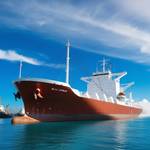Sonar
Sonar is a technique that uses sound to navigate, communicate with or detect other vessels, and to observe the distance and velocity of underwater objects. The acoustic frequencies used vary from extremely low (infrasonic) to very high (ultrasonic). The word “sonar” also describes the equipment used to gather and analyze acoustic information. Sonar is used in depth sounding, fish finding, seafloor mapping, Doppler navigation, and acoustic location systems for divers. The term for the scientific study of underwater sound is hydroacoustics.
Three types of technology are categorized as "sonar":
- Passive sonar uses receiving sensors to listen for and analyze the sound made by vessels
- Active sonar uses an acoustic projector to emit pulses of sounds and a receiver which detects the echoes to find the range, bearing and relative motion
- Acoustic communication systems use a projector and receiver at both ends of the acoustic path
Sonar was first proposed as a means of detecting icebergs, but government interest in and funding of sonar systems did not take off until World War I highlighted the threat posed by submarine warfare. Modern technological innovations have included rapid-scanning and side-scan sonar, the echo sounder (or depth detector,) and within-pulse electronic sector scanning sonar (or WPESS). Military uses of sonar include systems used in acoustic homing torpedoes, in acoustic mines and mine detection.

NOAA, Northrop Grumman to Release Sonar Images of the USS Monitor Shipwreck Site
NOAA and Northrop Grumman will release the first-ever high definition sonar images…

Phoenix Assists US Navy with Aircraft Recovery in the South China Sea
Phoenix's International (Phoenix) recently assisted the Naval Sea System Command…

FarSounder Argos 3D Sonar Integrated with Anschütz SYNAPSIS (W)ECDIS NX
FarSounder, an innovator in 3D forward looking navigation sonar technology, has announced…

FarSounder Announces SEA.AI Integration in Web Application
FarSounder announced an integration with SEA.AI, a leader in AI-powered vision systems…

Thales, HII Partner to Develop Autonomous Undersea Mine Countermeasure Capabilities
HII and Thales announced the successful integration and field exercise of the Thales…

FarSounder Introduces 3D Sonar Web Application
FarSounder, a leader in 3D Forward Looking Sonar (FLS) technology, has released its…

Kongsberg Discovery Launches FS80 Trawl Sonar
Kongsberg Discovery has announced the commercial launch of the FS80 Trawl Sonar.The compact…

Two NUWC Division Newport Employees Win 2024 American Society of Naval Engineers Awards
Two Naval Undersea Warfare Center (NUWC) Division Newport engineers have won American…

Massa Products Corporation: Innovating Sonar Technology & Securing the Future of the Maritime Workforce
Dawn Massa Stancavish, President, CEO, and Chief Innovation Officer, Massa Products Corporation…

First Dutch Navy Mine Countermeasure Vessel Starts Sea Trials
The Vlissingen, the second of the series of mine countermeasures vessels (MCM) of…

Fascinated by Shipwrecks Podcast: Episode 8 – Vince Capone
The Fascinated by Shipwrecks Podcast, hosted by Kathy A. Smith, is dedicated to…

Obituary: Karl Kenny, Founder, Kraken Robotics
Kraken Robotics Inc. announced the passing of founder and former CEO, Karl Kenny on February 11…
A winch is a mechanism used to reel in, to let out, or otherwise adjust the tension of a rope, wire, or cable. Boats and ships make use of multiple winches to handle halyards, sheets, as well as anchor or mooring lines. The basic mechanism consists…

Bulk carriers are vessels that transport bulk cargo, such as coal, ore and cement. Bulk carriers play an important role in the global trade, facilitating the transportation of large quantities essential raw materials for different industries.
U.S. Rebuilding Shipbuilding Industry with Policy and InvestmentThe U.S. government is launching a new era for shipbuilding, with a focus on industrial base renewal, national security, and economic growth. Key developments include:The establishment…
Marine salvage is the process of rescuing a ship, its cargo, or other property from peril. Salvage encompasses rescue towing, putting out fires, patching or repairing a ship, refloating a sunken or grounded vessel, moving a disabled vessel in order to clear navigation channels…
A ship simulator is an advanced training device; an electronic or mechanical system used to expose vessel operators and crew members to typical shipboard conditions and systems. Simulation training is not a substitute for the experience of training on an actual vessel…



















